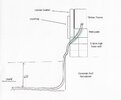- Joined
- 11 Jan 2004
- Messages
- 46,052
- Reaction score
- 3,581
- Country

Just got to my old regs.
The 13th Edition (1955) and 14th Edition (1966) both state that cables should be buried at a depth of at least 18 inches (457mm).
The 15th Edition (1981) says cable shall be buried at a sufficient depth to avoid their being damaged by any disturbance of the ground reasonably likely to occur during the normal use of the premises.
The 16th Edition (1991) says cable shall be buried at a sufficient depth to avoid being damaged by any disturbance of the ground reasonably likely to occur.
The 17th Edition (2008) says cables shall be at a sufficient depth to avoid being damaged by any reasonably foreseeable disturbance of the ground.
The 13th Edition (1955) and 14th Edition (1966) both state that cables should be buried at a depth of at least 18 inches (457mm).
The 15th Edition (1981) says cable shall be buried at a sufficient depth to avoid their being damaged by any disturbance of the ground reasonably likely to occur during the normal use of the premises.
The 16th Edition (1991) says cable shall be buried at a sufficient depth to avoid being damaged by any disturbance of the ground reasonably likely to occur.
The 17th Edition (2008) says cables shall be at a sufficient depth to avoid being damaged by any reasonably foreseeable disturbance of the ground.

